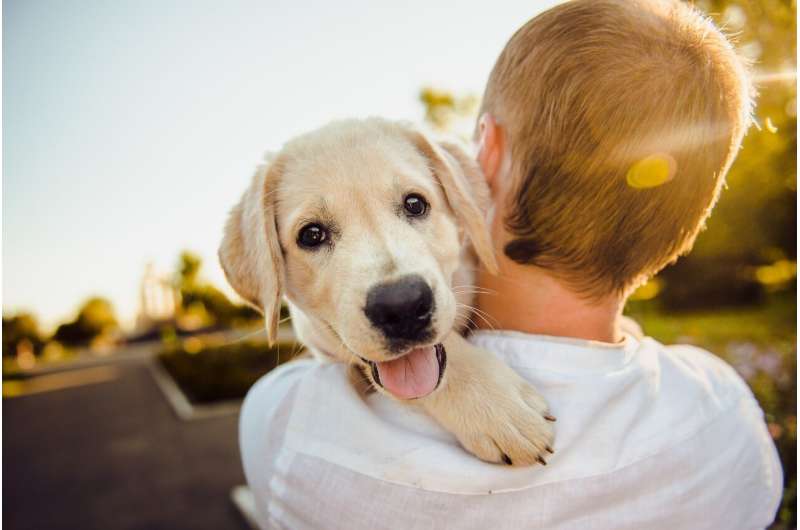Guardian, kids, or companions? The roles that owners attribute to their dogs vary and may affect dogs' daily lives

What role do dogs play in today's world? For many, they are more than just pets. New findings from the Department of Ethology at Eötvös Loránd University show that whether seen as friends, family members, children or guardians, these roles affect the way dogs are cared for, suggesting shifting dynamics in human-animal bonds shaped by societal trends and individual owner profiles.
In Western cultures, more and more people see their dogs as their best friends, family members or even their furry children. In fact, past studies have shown that up to two-thirds of dog owners consider their dog to be more important than any human in their lives.
One reason for these increasingly strong bonds between humans and dogs may be the demographic transition seen over the last few decades, characterized by smaller families and falling birth rates. Indeed, in a time when people feel lonelier and more socially isolated, dogs may have become a perfect substitute for human contact. However, not much scientific research has looked at this societal trend and how it affects the daily lives of dogs.
What is it about dogs that people love so much? Does regarding dogs as friends, children or family members influence the way owners care for them?
To answer these questions, researchers at the Department of Ethology at Eötvös Loránd University (ELTE) have studied questionnaire data collected from about 800 dog owners. The findings were in Scientific Reports.
First, results revealed that almost all owners really liked the physical contact with the dog (97.6% of owners), the "unconditional love" the dog provides them (93.7%), and the sight and beauty of the dog (88.4%). Other benefits were less unanimous—for example, 24.3% of owners didn't benefit from the social interactions generated by their dog, while 36.3% liked it a lot.
One key question was, of course, what role(s) the dog played in the owner's life. The novelty of the present study was that, instead of just choosing one main role, owners could attribute multiple roles to their dogs, like friend, family member, child, colleague, domesticated animal, and security guard.
"Interestingly, even though we collected data from online groups dedicated to family dogs, the owners weren't all the same" explained Laura Gillet, Ph.D. student at the Department of Ethology and lead author of the study. "We found three distinct profiles of owners whose dogs played diverse social and practical roles."
Indeed, for some owners, the dog had dual functions: Both practical as a colleague and a security guard, but also a strong emotional and social function as the most important individual in their lives.
Another group of owners, labeled as "dog parents," emphasized the human-like roles of the dog, suggesting a very close bond but no practical functions. The last group kept dogs mainly for companionship while showing a greater emotional distance from their pets.
"As we previously assumed, several dog and human factors were associated with these three profiles. For instance, dogs with dual functions were perceived as very obedient and were trained with positive reinforcement and professional training methods like clicker training," noted Prof. Eniko Kubinyi, head of the Department of Ethology and of the MTA-ELTE "Momentum" Companion Animals Research Group.
"Moreover, they often belonged to breeds known for their working abilities, such as the Border Collie, Belgian Shepherd Dog and German Shepherd Dog."
On the other hand, owners keeping dogs for companionship purposes preferred the Mudi, the English Cocker Spaniel and the Labrador Retriever breeds, spent less time with their dogs on a daily basis and were older than other owners. Lastly, "dog parents" were more likely than others to house their dogs indoors only, and their favorite breeds were Border collies, Vizsla, Boxer, and Dachshund.
The researchers also collected information about the behavioral problems of the dogs as indicators of canine welfare, as these may result from inadequate management practices. The most frequently reported issues were jumping up (33.2% of dogs), chasing animals (28.5%), territoriality (26.7%), overexcitement (20.9%), and fear of new things or situations (19.4%). However, no association was found between these perceived behavioral problems and the roles attributed to the dogs.
In sum, dogs can play many roles in their owners' lives and provide them with different benefits.
This new research method better captures the complexity of the dog-human bond.
Moreover, the roles that owners attributed to their dogs seem to have direct implications for dogs' daily lives, although in this convenience sample of dog enthusiasts, endowing dogs with human-like roles had no negative effect on canine welfare.
Finally, the findings also suggest a generational shift in the perception of the dog-owner relationship, with younger owners forming stronger emotional bonds with their dogs and more likely to refer to them as children than the previous generation.
More research is needed to better understand the consequences of this phenomenon in terms of animal and human well-being, but also what it says about our modern societies.
More information: The role of dogs is associated with owner management practices and characteristics, but not with perceived canine behaviour problems., Scientific Reports (2024).
Journal information: Scientific Reports
Provided by Eötvös Loránd University

















